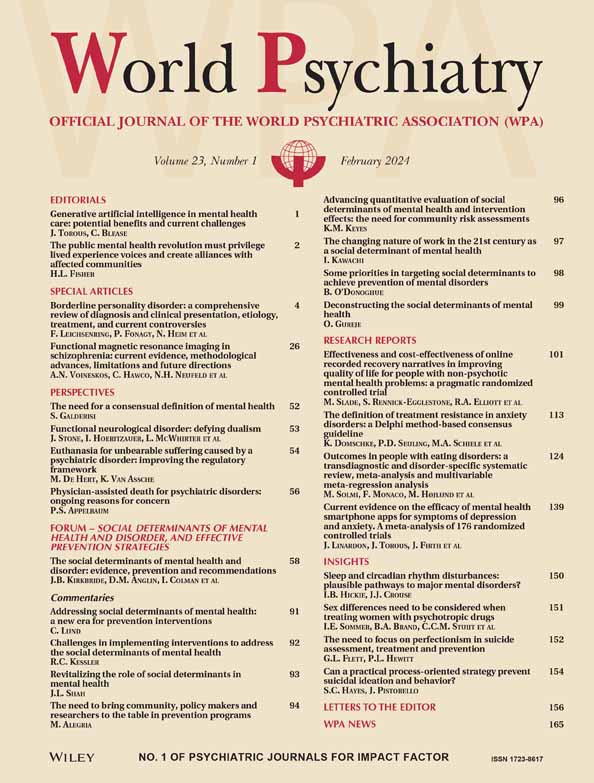WPA Volunteering Programme: lessons learnt so far
Capacity building has been one of the priorities of the WPA Action Plan 2020-20231-3. In order for the Association's efforts to be more effective, Working Groups started formulating plans, and pilot projects were established4-11. The WPA Working Group on Volunteering was organized to share and enhance clinical knowledge and skills for improved patient care12-14.
This Working Group is made up of psychiatrists with experience in organizing and running volunteer education activities, as well as a representative of families of persons with lived experience of mental health conditions. The Group has been established to enhance training opportunities for WPA Member Societies in countries that would like assistance from volunteer trainers from other Societies.
The WPA Volunteering Programme aims to link interested WPA Member Societies. Linking the expertise and experience of volunteer trainers can contribute to the development of skills, knowledge and confidence of those psychiatrists and their trainees. Also, mental health professionals who have less access to training opportunities and education can take part.
Although the WPA Volunteering Programme was originally expected to be implemented locally and in person, the circumstances surrounding the COVID-19 pandemic have significantly impacted these plans12. Therefore, the activities have focused on the implementation of volunteering work in various countries through support for online teaching. The Working Group members have now gained considerable experience in preparing and running online volunteer training programmes. Pilot projects have taken place in Mexico13 and Pakistan15. Work is currently underway to prepare volunteer projects in Libya, Honduras and Guatemala14. Many useful lessons have been learnt from these pilot projects. One of these lessons is that transcultural psychiatry is a pleonasm: all psychiatry is transcultural.
Before starting a volunteering programme, it is important to identify and agree on the purpose and aims of the programme within the structure of psychiatry education in the host country. This can be done by establishing contact with stakeholders who will be involved in preparing and delivering the training. This process builds a training team as well as a partnership between host and volunteer professionals. Moreover, it delivers information about the cultural and educational background of the country.
Local resources and systems which will influence the impact and sustainability of a project include national mental health policy, current training resources and styles, and local collaborators. Support from senior colleagues and other stakeholders from the host country (top-down support) helps setting up the project and smooths the way through possible obstacles. It is also useful to know about the available international aid in teaching and service developments (e.g., World Health Organization, United Nations) which can be used in the programme.
Experience has shown that tailoring to the specific needs instead of offering off-the-shelf prepared lectures increases the interest of participants. Therefore, volunteers need to be able to organize a flexible training programme, be culturally aware, enjoy team work, be willing to give time to preparation and work with colleagues from different backgrounds. It is important to strike a balance between training that is directly useful in clinical practice and having an impact on improving the local quality/accessibility of mental health care. Trainers need to be prepared for the experience that volunteering can be challenging as well as rewarding.
Despite the seeming role of the volunteer as a leader in the Volunteering Programme, it is recommended that host country professionals actually lead the programme. They know what is needed and what might work within their culture and resources. Volunteers are invited guests. It is highly recommended to volunteers to be gracious and humble. Our aspiration is to have service users and carers involved in the project design and roll out. Language is critical in making training understandable and useful, both for practical and cultural reasons. Even if trainers speak in English, case discussions and role plays can be conducted in the local language. Proficiency in English is usually not equal amongst participants.
An interim assessment during the training, questioning which methods are successful and which are not, helps to adapt to local (cultural) specificities when needed. Interactive training is usually welcome, and there are numerous books, articles and manuals available online for participants to read (as suggested by trainers) before, between and after sessions. It is recommended that training offers a focus on human rights, lived experience involvement, and alternatives to coercion, in line with the global priorities and values of the WPA. It is preferable for the trainees to have supervision/mentoring.
Following the completion of the training, it is important to evaluate its positive and negative aspects. After a successful course, it is essential not to hesitate to review the training material and refresh courses for future work. A final evaluation of the course is important not only for the volunteer, but also for the host Society, to ensure sustainable benefits and ongoing plans.
Volunteering is a professional activity with the same demands of evidence-based practices: evaluations, feedback and courteous behaviour. Experience suggests that volunteering is a win-win endeavor, as all people involved learn, usually in many areas. This includes clinical, academic and teaching skills. Some volunteers report that they had life changing experiences.
The WPA Volunteering platform is now available to all WPA Member Societies. Information is provided on the official WPA webpage (https://www.wpanet.org/wg-on-volunteering). Member Societies who would like to receive assistance with training in any area of psychiatry are welcome to submit a request for such assistance, discuss their needs, and understand how the Working Group can link them with suitable volunteer trainers. Member organizations with psychiatrists who would like to offer their skills and time on a voluntary basis are also invited to join the WPA Volunteering Programme.




